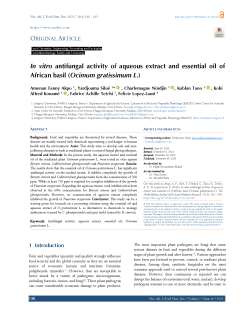In vitro antifungal activity of aqueous extract and essential oil of African basil (Ocimum gratissimum L.)
Abstract
Background: Fruit and vegetables are threatened by several diseases. These diseases are mainly treated with chemicals representing a real danger to human health and the environment. Aims: This study aims to develop safe and non-polluting alternatives such as medicinal plants to control fungal phytopathogens. Material and Methods: In the present study, the aqueous extract and essential oil of the medicinal plant Ocimum gratissimum L. were tested in vitro against Botrytis cinerea, Colletotrichum gloeosporioides and Fusarium oxysporum. Results: The results show that the essential oil of Ocimum gratissimum L. has significant antifungal activity on the studied strains. It inhibits completely the growth of Botrytis cinerea and Colletotrichum gloeosporioides from the concentration of 500 ppm. While at least 750 ppm is required for complete inhibition of the growth of Fusarium oxysporum. Regarding the aqueous extract, total inhibition has been observed at the 60% concentration for Botrytis cinerea and Colletotrichum gloeosporioides. However, no concentration of aqueous extract completely inhibited the growth of Fusarium oxysporum. Conclusion: This study can be a starting point for research on a promising solution using the essential oil and aqueous extract of O. gratissimum L. as alternatives to chemicals to manage anthracnose (caused by C. gloeosporioides) and gray mold (caused by B. cinerea).
Keywords: Antifungal activity, aqueous extract, essential oil, Ocimum gratissimum L.
Full text article
Authors
Copyright (c) 2023 Amenan Fanny Akpo, Yardjouma Silué, Charlemagne Nindjin, Kablan Tano, Kohi Alfred Kouamé, Fabrice Achille Tetchi, Felicie Lopez-Lauri

This work is licensed under a Creative Commons Attribution 4.0 International License.
-
Attribution — You must give appropriate credit, provide a link to the license, and indicate if changes were made. You may do so in any reasonable manner, but not in any way that suggests the licensor endorses you or your use.
-
No additional restrictions — You may not apply legal terms or technological measures that legally restrict others from doing anything the license permits.





